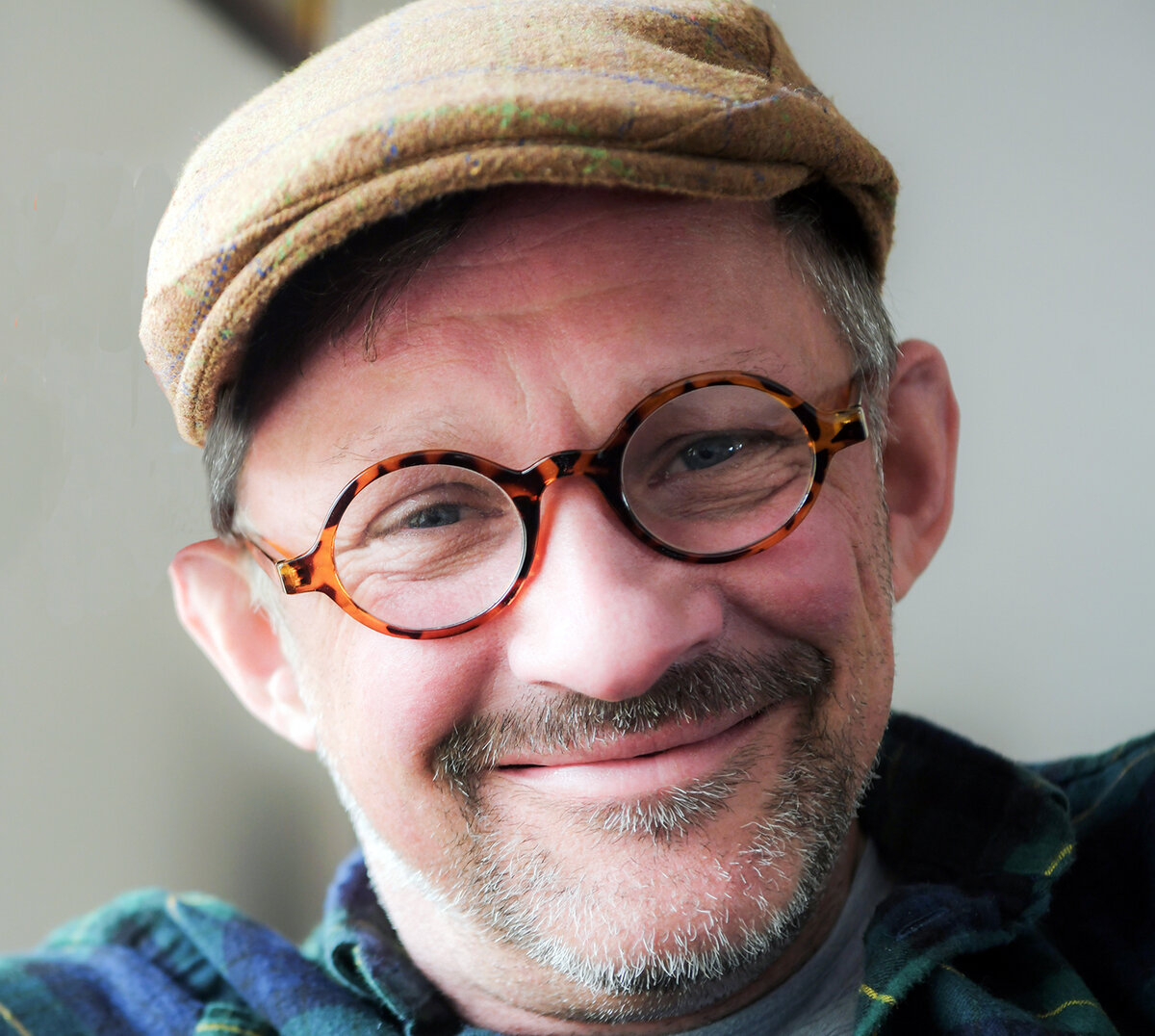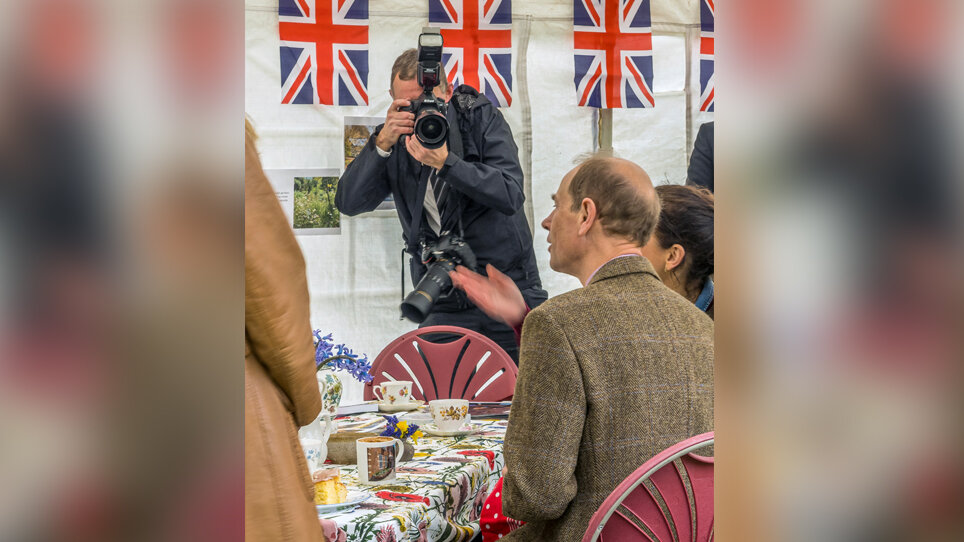
“I see autism as a gift when it comes to photography and creativity.”
Andy
- reflects on how being autistic has made him a better photographer.
In this Stories from the Spectrum feature, we speak to Andy, autistic man, royal photographer and radio presenter. Andy tells us what his life was like growing up without an autism diagnosis, how being autistic has helped him to become a better photographer, and the highlights of his photography career.
When did you first know or start to think you were autistic?
I found out I was autistic when I was about 45 years old, so it was a late diagnosis. I think part of the reason why I didn’t identify that I was autistic was because so much happened in my life. My brother passed away when I was 19 and he was only 16. That kind of destroyed the family and from there I was homeless and then I moved to Scotland. Then I got into a relationship and became a Father - the happiest moment of my life. But sadly the relationship broke down and I spent my late twenties in a very unstable and often self-destructive way. Not long before that, I became diabetic. I was putting my difficulties down to all of these things together, rather than any specific reason. So my diagnosis was a light bulb moment.
Incidentally, I was diagnosed as autistic from a therapy session that was put together because I was struggling to manage my diabetes. The therapist thought that maybe there was a reason why I couldn't manage my diabetes in the way that “normal” people could. And the first thing I said to her was: “I can't be autistic, I'm quite good with people and I do it for a living.” But then it started to make real sense, and since then I think being diagnosed has been good for me.
What was it like growing up without an autism diagnosis?
I knew from an early age that I was different, but I didn’t understand what it was at all. I was not happy at school: I didn't fit in with other people, I got bullied a lot and I struggled to make friends. I became quite depressed, and I contemplated suicide quite seriously when I was around 15.
I also did really badly at school. When I left school, my father turned around and said, “You're on your own now”, thinking I was lazy. It was a very confusing time. I never really understood what was going on in my life and it went on like that for years.
How did you develop your interest in photography, and when did you decide to start a career as a photographer?
My first real job at 17 was in a newspaper office printing photos and a photographer position came up. I struggled with the technical side though. Later, after being homeless, I applied for a job photographing babies in shopping centres. When I started the job, photography quickly became my main coping mechanism for dealing with people – put me behind a camera and I was invincible, even when I didn't understand how the camera worked. And that became really powerful, because then I thought: “Okay, if I can do this, maybe I can do weddings or portraiture with families.”
The first eight years of my career, I had no idea how to use a camera properly. When I got seriously into photography, I had to deal with the technical side of it, which made my work a lot harder. But it made me into a better photographer because I had to work harder and learn to edit better to make up for my lack of technical ability.
Do you think that being autistic has helped you as a photographer? If so, how?
I see autism as a gift when it comes to photography and creativity. I’m an absolute perfectionist, and that's part of my Asperger's. If I'm not happy with the photos, they never leave the studio or the camera.
I think a lot of autistic people have this thing where you’re very much in the moment, and then if something else comes along, you go to pieces. So when I’m working, I'm completely focused in the moment, so it probably does give me an edge.
I'm also very good at reading faces. When I meet somebody, I've got about five minutes to read their face to see what type of person they are, and then act accordingly to sort of get the best out of them in a photo. I don't think I could do that if I wasn't autistic. As a result, I've always managed to get pictures that people are happy with and feel are natural.
What is the most challenging part of your role?
I think the hardest thing is dealing with mood swings, because I'm diabetic as well and having to manage that is a constant daily thing for me. I now have a state-of-the-art insulin pump that does a lot of it for me, which has improved things but I struggle with carb counting and routines – work-wise I always have to be prepared for hypos and factor in breaks in long assignments.
I also find dealing with the financial side of my role difficult, because I think a big part of my autism is that I’m not great with numbers. I've never been wealthy, despite having done some incredible stuff in my career, but I'm not driven by money either, so trying to find that balance is really difficult for me.
How did you become a royal photographer?
In 2010, I was working at a high-profile celebrity wedding, and the best man was involved in the Royal Variety Performance and asked me if I'd be interested in becoming a photographer for them each year. I did that for 12 years, which was an incredible experience that gave me kind of a royal accreditation. I also did a lot of work with Surrey County Council, where I was occasionally involved in royal photoshoots and visits. After Covid-19, these photoshoots became more and more frequent.
Ironically, my first ever royal photoshoot was when I was working for a newspaper when I was 17. I was given this camera and sent off to photograph Princess Anne at Alton Towers. I had no idea what I was doing; I think three pictures came out! Since then I've photographed her about 15 to 20 times. I've photographed pretty much all of the royals, and I've even had a laugh with some of them, but I've been photographing the Duchess of Edinburgh for many, many years.
What has been your personal highlight of your career so far?
In 2016/17 I did some work with with the High Sheriff of Surrey and his wife, who have a charity in Zambia. They asked me if I'd go with them to Zambia and photograph different schools across the communities they supported.
Initially, I didn't know how I was going to communicate with the children, despite the fact I was there to photograph them. But at the first school we visited, I photographed this little boy and showed him the photo. His eyes were really wide, and it occurred to me that there weren’t any mirrors anywhere, and these children might not have ever seen a reflection or a photo of themselves.
Within seconds, I was absolutely surrounded by kids. I started taking photos and showing them on the camera, and all their friends were laughing and trying to jump in front of the camera and be photographed. Just seeing the wonderment on their eyes was amazing: without actually speaking, the camera became a way of communicating with them.

"If I wasn't autistic, I wouldn't be the photographer that I am now – because it's those autistic traits that give me the edge in a lot of ways, and also make me work in a different way and make me work harder."
What does being autistic mean to you?
If I wasn't autistic, I wouldn't be the photographer that I am now – because it's those autistic traits that give me the edge in a lot of ways, and also make me work in a different way and make me work harder. At times, being autistic means to me confusion, frustration, overthinking. But it's made me who I am and I've had an incredible career because of it.
What is one thing you wish more people got right about autism?
I think that the biggest thing is it's difficult to understand what autism actually is, and a lot of people see autism as an illness. There needs to be more understanding that autism is a gift: it doesn't mean that you're different to anybody else, you've just got a different wiring system in your brain. Some autistic people are some of the most inspiring people in the world because of the way they think.
I certainly think that something that needs to change with autism is schooling. Having been to Salesian School a Cullum Centre school, which is incredible, that's what needs to happen. We need schools that can nurture autistic kids to work within their own abilities and really give them the chance to shine by helping them to understand their autistic traits and the tools to be able to work with them and excel.
What advice would you give to other autistic people looking to start a career as a photographer?
Photography has changed enormously over the last 15 to 20 years. There's only a few people that really make money and often, photography doesn't pay great. But look at it as a hobby to start with and think of it that way and build it up. Getting experience and volunteering is really good: you can offer to help photographers and watch what they do.
I do think photography is great for autistic people because you can literally hide behind the camera most of the time. I’ve also done a lot of work in radio and co-founded a radio station, and we've got a couple of autistic people on there that find it really good because nobody can see them and it's quite comfortable.
I would also say don't live too much in your own head, because that's what I did for most of my life, and you end up locked away in this quite solitary world. When autism and mental health get together, it can be really difficult. Just remember that however you're feeling right now, that's not the end of your story – there’s more to come. So do talk and do get help.
One thing about being autistic for me has always been that I was always uncomfortable in 'social' situations but also was quite stubborn and it seems I developed 'subconscious mechanisms' to cope with people which became very powerful the 'camera' was my mask in the same way as 'humour' is my mask when I do interact with people - I think embracing a mask is a good coping mechanism and important for autistics to identify. Not sure if that is useful but if people are encouraged to find their mechanisms it is an important way to help them through life.
Photos by Andy Park and Allan Arthurs
